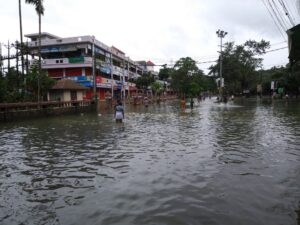
Offers of help have poured in from across the world, from nations including the Maldives, Qatar, and the United Arab Emirates. The Centre, however, is so far declining offers of assistance from foreign governments and choosing to use its own resources to help the state rebuild.
A circular from the Union Ministry of External Affairs has instructed Indian missions abroad to “kindly express…appreciation” if offers of foreign assistance are made, but to “politely convey…that in the present circumstances, the Government of India has taken the decision to rely solely on domestic efforts to tide over the changes.”
The floods which ravaged Kerala in recent weeks were the worst in almost a century. More than 400 people have been killed and several lakhs have been displaced. As the state enjoys respite from the rains, efforts are underway to rebuild and offer relief to its citizens, many of whom are being housed in displacement camps.
The floods inflicted an estimated $3 billion worth of damage. More than 10,000 kilometres of roads have been lost and more than one lakh buildings have sustained damage. “Tough days are ahead,” says Chief Minister Pinarayi Vijayan.
“The floods which ravaged Kerala in recent weeks were the worst in almost a century”
The Centre is intervening to help Kerala, mobilising Rs 600 crore ($85.9 billion) in assistance to the state earlier this week. It also exempted emergency resources from the Goods and Services Tax (GST) and customs duty, allowing it to reach Kerala more quickly. Other states are also contributing, with Telangana, Maharashtra and Uttar Pradesh offering the most: Rs 25 crore, Rs 20 crore and Rs 15 crore respectively.
The Centre’s decision to decline foreign aid is not a new stance. It is, in fact, a long-standing policy introduced in the aftermath of the 2004 Indian Ocean tsunami by then-Prime Minister Manmohan Singh. It is one which has been observed in the aftermath of natural disasters since, including following the 2013 floods in Uttarakhand which killed 6,000 people.
Some have questioned whether the Centre will accept foreign aid in Kerala’s case. However, the policy is being honoured so long as India possesses the capacity to deal with the crisis unilaterally. Non-government organisations (NGOs) from abroad will still be able to contribute to helping the state rebuild.

“The policy [of declining foreign aid] is being honoured so long as India possesses the capacity to deal with the crisis unilaterally”
The decision of the Centre to decline foreign aid has angered some in Kerala – some of whom note that the aid pledged by the Centre falls short of what Kerala requested and are questioning why foreign governments should not be allowed to help.
CM Vijayan requested Rs 2,600 crore in assistance, of which the Centre pledged Rs 600 crore. “We asked for 2000 crore, they could give us only 600 crore,” Kerala’s finance minister Thomas Isaac argued. “So given that, I don’t know why they should deny some government or individual [who can help].”
Isaac drew attention to the fact that, of the three million Indians working in the UAE, eighty percent are from Kerala. Such sentiments were echoed by CM Vijayan. He argued that the Emirates “cannot be considered any other nation…Indians, especially Keralites, have contributed immensely to their nation building.”
Some internal sources have reportedly said the Centre is open to the idea of accepting foreign aid but that it would be subject to the same approval process. At present, nothing much seems to have changed – and whether the Centre will relax its policy for Kerala’s sake remains to be seen.

